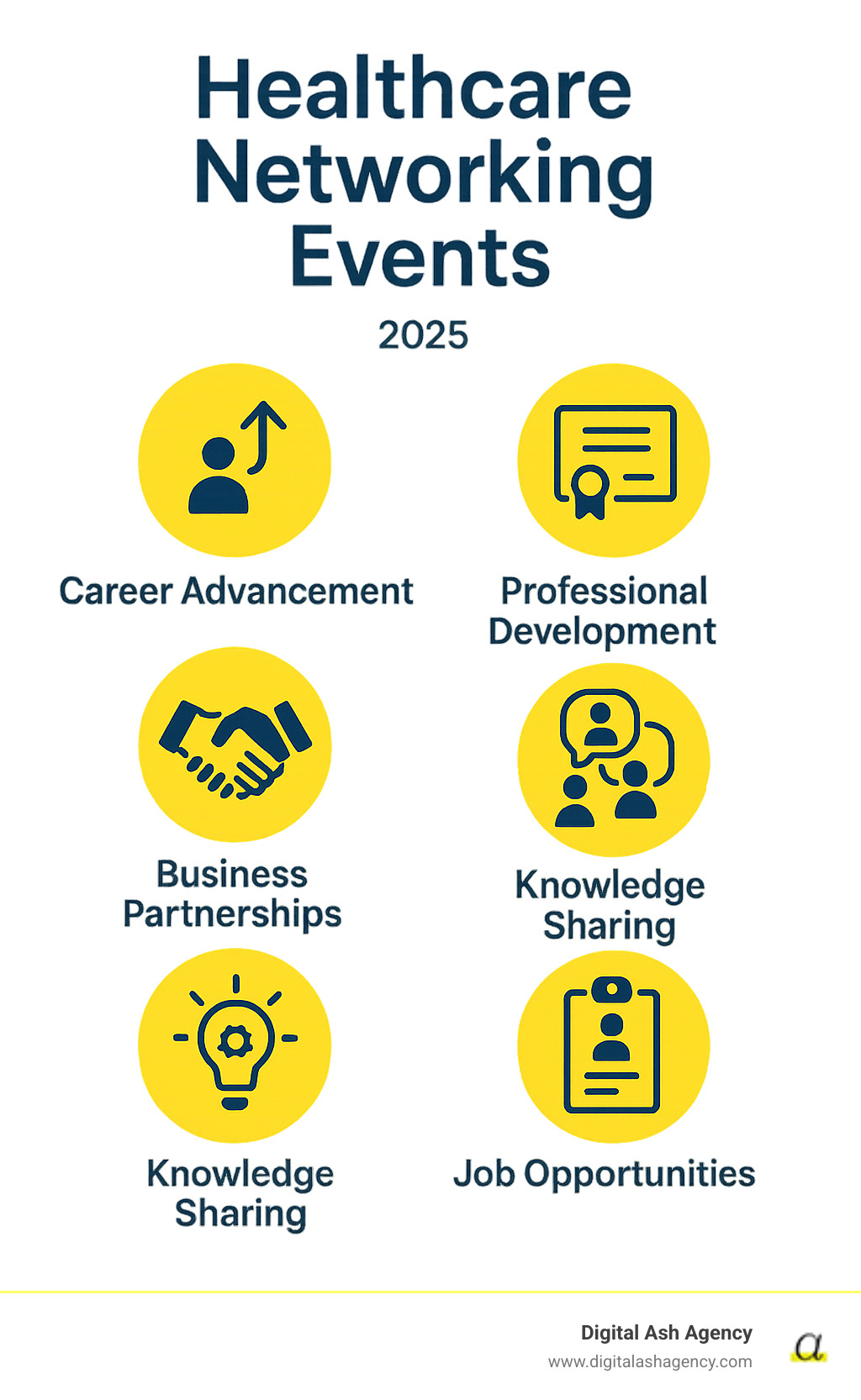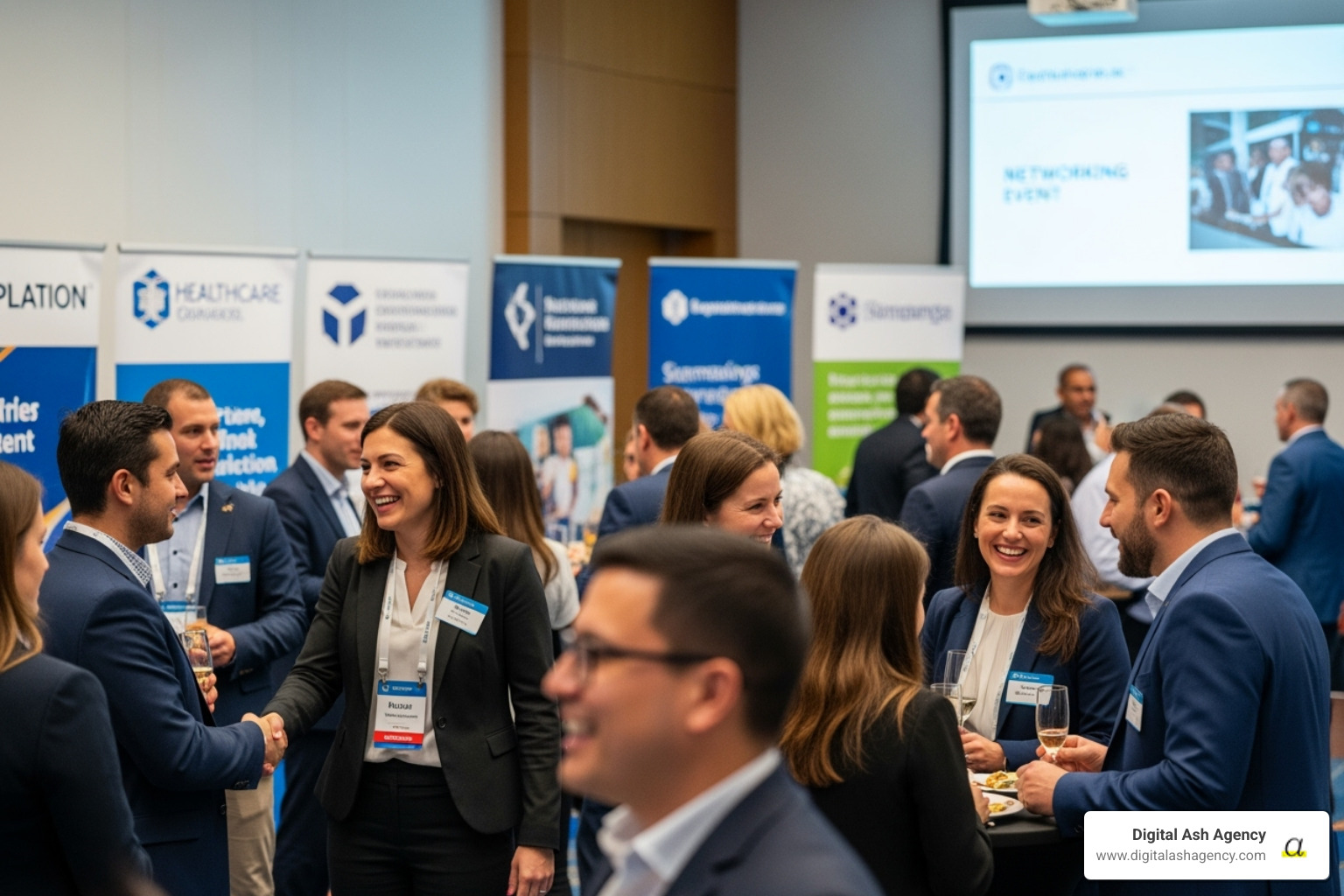
Why Healthcare Professionals Need Strategic Networking More Than Ever
Healthcare networking events are organized gatherings where medical professionals, students, administrators, and industry leaders connect to share knowledge, build relationships, and advance their careers. These events range from local mixers to large-scale conferences and virtual summits.
Quick Guide to Healthcare Networking Events:
- In-Person Events: Monthly mixers, annual conferences, specialty summits
- Virtual Events: Webinars, online networking sessions, digital health forums
- Hybrid Events: Combined in-person and virtual experiences
- Where to Find Them: Professional organizations (ACHE, HIMSS), Eventbrite, local chapters
- Common Topics: AI in healthcare, health equity, precision medicine, policy changes
- Costs: Free local mixers to $1,000+ for major conferences
- Benefits: Career advancement, partnerships, mentorship, referrals
The healthcare industry faces unique networking challenges. Non-compete agreements can limit where you practice, but they can't stop you from building professional relationships. In competitive markets, the right connections can open doors that traditional marketing cannot.
Organizations like the American College of Healthcare Executives (ACHE) and HIMSS offer access to thousands of professionals through national conferences and local chapter events. These gatherings create opportunities that go far beyond exchanging business cards.
I'm Ashley Gay, and I've helped my physician husband build a practice that generated $239K in its first 90 days through strategic networking and relationship building, even with an enforceable non-compete. Healthcare networking events became a cornerstone of our growth strategy, leading to 263 referring physicians and nearly $1 million in first-year revenue.

The Power of Connection: Why Healthcare Networking Matters
In today's competitive landscape, strategic networking is more critical than ever. Healthcare networking events are the foundation for career growth, business partnerships, patient referrals, and staying current with industry trends. They create powerful opportunities that go far beyond simple socializing.
Professional organizations connect members with thousands of healthcare executives, which can be transformative for anyone looking to advance their career or grow a practice.
Innovation thrives when brilliant minds connect. As HIMSS notes, networking is "crucial for creating prosperous partnerships and making a difference in the global digital health ecosystem." These conversations spark breakthrough ideas and forge strategic alliances.
For established practices, networking opens doors to consulting opportunities and provides insights into healthcare administration. It's where you find your next business partner, learn about emerging technologies, or find solutions to operational challenges.
At Digital Ash Agency, we've seen how powerful these connections can be. Our digital marketing for doctors strategies are most effective when combined with strong professional relationships built through networking.
For Students and Early Careerists
Starting a healthcare career can be overwhelming, but healthcare networking events are a secret weapon for success. They offer real-world insights from professionals who have walked the path you're just beginning.
Mentorship is one of the most valuable benefits. Many professional chapters run dedicated mentoring programs to connect aspiring professionals with experienced guides. Having someone who's been where you want to go show you the way is invaluable.
Events with sessions like "Administrative Fellowships 101" are designed for students and newcomers. They don't just explain job opportunities—they help you understand industry nuances and identify career paths you might not have considered.
Building your professional reputation starts now. Every conversation and connection contributes to how the healthcare community perceives you. Student pricing and special programs make these events accessible, removing financial barriers.
If you plan to start your own practice, our resources for new practices explain how early networking pays dividends later.
For Established Professionals and Practices
For seasoned professionals, networking shifts from career building to strategic growth. Healthcare networking events become a competitive advantage for forging alliances, sharing best practices, and recruiting top talent.
Patient referrals often flow from trust-based relationships built at conferences. Colleagues recommend your services because they know your character and competence.
Networking can also help you explore service line expansion. A casual conversation might reveal an unmet community need or introduce you to a specialist who could complement your services. These organic findies often lead to successful business ventures.
Developing a solid business plan for healthcare requires understanding market dynamics learned through direct conversations with peers. Navigating competitive markets is easier when you have allies who share insights.
As an established professional, you also have the opportunity to give back. Your experience is valuable to others, creating a positive cycle of shared knowledge and mutual support.
Finding and Selecting the Right Healthcare Networking Events
Finding the right healthcare networking events doesn't have to be overwhelming. The key is to match the event to your specific goals, personality, and schedule.

Different Types of Healthcare Networking Events
The world of healthcare networking offers something for everyone. In-person events remain the gold standard for building deep connections. Casual mixers are perfect for breaking the ice, while larger conferences and summits offer a full package of keynotes, breakout sessions, and dedicated networking lounges. Workshops provide hands-on learning in more intimate settings.
Virtual events have revolutionized how we connect, offering incredible flexibility and accessibility. Webinars and online summits bring together professionals from across the country, breaking down geographical barriers and saving on travel costs.
Hybrid events offer the best of both worlds, allowing you to attend in person or join virtually. This flexibility is a major benefit for busy professionals.
| Event Type | Cost Range | Reach | Engagement Level | Networking Style |
|---|---|---|---|---|
| In-Person | Mid to High (Travel costs) | Local to National/International | High (Direct interaction) | Formal & Informal, Relationship Building, Experiential |
| Virtual | Low to Mid | National to Global | Moderate (Screens, Chat) | Structured (Breakout Rooms), Targeted (1-on-1s) |
| Hybrid | Mid to High | Local to Global (Flexible attendance) | Moderate to High (Mixed experience) | Flexible, Mix of direct and digital connections |
Where to Find Events
Professional associations are a goldmine for networking. The American College of Healthcare Executives (ACHE) and HIMSS are leading organizations with numerous national and local chapter events throughout the year. These chapters are excellent for making valuable connections in your own region.
Online platforms have made finding events incredibly simple. Eventbrite is a great resource; just search for "Health" and "Networking" to find everything from professional forums to wellness mixers in major cities.
Don't forget about educational institutions and social media. Universities often host public symposiums, while LinkedIn groups can alert you to exclusive networking opportunities.
What to Look for in Healthcare Networking Events
Choosing the right event is like creating a treatment plan—it must match your goals. Start with the event topics. Hot discussions revolve around AI in healthcare, precision medicine, health equity, and healthcare policy. Find events that align with your passions and professional focus.
Review the speaker lineup and attendee list if available. Quality speakers attract quality attendees, and knowing who will be there helps you prepare for meaningful conversations. Events that attract a diverse mix of executives from industry, education, and government offer high-level networking potential.
Finally, look at the event sponsors. When major healthcare systems like Northwell Health or Mount Sinai sponsor an event, it's a strong indicator of quality. The goal isn't to attend every event—it's to choose strategically to build a network that supports your career for years to come.
Before, During, and After: A Guide to Networking Success
Attending healthcare networking events is only half the battle. Maximizing your experience requires a strategic approach before, during, and after. Thoughtful preparation, genuine engagement, and consistent follow-up are what transform brief handshakes into lasting professional relationships.

Step 1: Prepare for Success
Successful networking begins long before the event. Set clear goals: are you seeking a mentor, potential referral partners, or new technology insights? This clarity will guide your conversations.
Next, do your homework. Research speakers and key attendees using the event agenda. Knowing who will be there allows you to prepare thoughtful questions instead of relying on generic small talk.
Prepare your elevator pitch. This isn't a script, but a natural way to share who you are and what you do. As we cover in our guide to branding for doctors, your personal brand should reflect your expertise and passion. Also, update your LinkedIn profile—people will look you up.
Step 2: Maximize Your Experience at Healthcare Networking Events
On the day of the event, arriving early provides a huge advantage. The room is less crowded, and people are more relaxed. You can connect with the most committed professionals before the main program begins.
When starting conversations, ask open-ended questions like, "What brought you to this event today?" or "What's the most interesting challenge you're working on?" This invites real dialogue.
Being a good listener is perhaps the most underrated networking skill. When you truly listen, people feel valued and remember the interaction. Move around the room to meet new people, and attend breakout sessions for deeper conversations on shared interests.
A pro tip: take discreet notes on the people you meet—their name, organization, and key conversation points. These details are gold for your follow-up. Find more tips on our blog.
Step 3: The Fortune is in the Follow-Up
This is where most people drop the ball. Without proper follow-up, promising connections fade.
Send personalized connection requests on LinkedIn within 24-48 hours. Write a brief note referencing your conversation. For example: "Hi Sarah, it was great discussing telehealth challenges at yesterday's leadership event. I'd love to stay connected!"
For your best connections, send a brief, personal email within 48 hours. Reference a specific detail from your chat to show you were engaged.
Suggest a natural next step, such as a brief call, sharing a relevant article, or making a helpful introduction. The key is to offer value, not just ask for something.
Nurturing long-term relationships is a marathon. Periodically check in with your connections, share insights, and offer help. These genuine relationships become the foundation for referrals, partnerships, and future opportunities.
Beyond the Mixer: Building Community and Finding Mentors
The real magic of healthcare networking events happens when we move beyond surface-level chats to build genuine communities. These gatherings are the foundation for mentorship relationships that can transform careers.

While a quick chat might yield a new contact, the relationships that truly advance your career are those where someone takes a genuine interest in your growth. These connections often begin at events but flourish through ongoing engagement.
Finding Mentors and Mentees
Mentorship in healthcare benefits everyone. Healthcare networking events provide the perfect environment to make these connections naturally.
Many organizational programs offer a structured approach. For instance, some local chapters of professional associations run mentoring surveys to connect aspiring professionals with experienced leaders. These formal programs remove the guesswork from finding a mentor.
However, some of the most powerful mentoring relationships start with informal connections. If you're drawn to a speaker or have a great conversation with someone, don't hesitate to express interest in learning from their experience. Most professionals are generous with their knowledge.
If you're an established professional, consider the impact you can have by offering to help someone earlier in their career. Giving back enriches your own professional journey and strengthens the entire healthcare community.
Specialized Communities and Inclusivity
Today's healthcare networking events recognize that our industry is diverse and that innovation comes from different perspectives. This shift toward inclusivity has created powerful specialized communities.
Events like HIMSS25 lead by example, hosting dedicated receptions that support specific groups. Their Women in Health IT Networking Reception creates a space for women to connect authentically, while their Celebration of Black Excellence Reception fosters connections that address unique challenges. The Veterans Reception recognizes the valuable skills military veterans bring to healthcare.
These specialized gatherings aren't about exclusion; they're about creating safe environments where people with shared experiences can connect more deeply.
Professional conduct and respect are paramount in all networking settings. Organizations like NYU demonstrate this commitment through comprehensive non-discrimination and anti-harassment policies, setting a standard for professional behavior at all healthcare gatherings.
Frequently Asked Questions about Healthcare Networking
We understand that jumping into healthcare networking events can feel overwhelming. Here are answers to the most common questions we hear from healthcare professionals.
What are the typical costs for attending these events?
The financial investment for healthcare networking events varies dramatically, so it's wise to budget effectively.
- Free to Low-Cost: Many local mixers, introductory webinars, and community gatherings are free or have a nominal fee. Some professional chapters operate with no membership dues, focusing on commitment over cost.
- Mid-Range: Workshops and seminars typically run from $50 to $500. These often provide excellent value with focused learning, materials, and quality networking time.
- High-Investment: National conferences and major summits can range from $500 to over $2,000 in registration fees alone. Factoring in travel and accommodation, these can be a significant investment but offer unparalleled access to industry leaders and cutting-edge research.
Membership benefits in organizations like ACHE often include discounted event pricing that provides great long-term value. Look for student and early-careerist pricing as well.
Are virtual networking events as effective as in-person ones?
Both formats have unique strengths and serve different goals. The best strategy often involves a mix of both.
Virtual events excel in reach and accessibility, eliminating travel costs and time constraints. This allows professionals from anywhere to participate. Modern virtual platforms use breakout rooms, virtual lounges, and pre-scheduled 1-on-1 meetings to facilitate focused, productive networking.
In-person events foster spontaneous conversations and non-verbal cues that are hard to replicate online. The energy of a live event often leads to deeper, more memorable connections.
Hybrid models are increasingly popular, offering the best of both worlds. Attendees can choose their participation style based on their schedule, budget, and comfort level.
What topics are most common at healthcare events today?
Event topics reflect the industry's current challenges and future opportunities. Key themes include:
- Digital Health and AI: Exploring how technology, from AI in diagnostics to machine learning, is revolutionizing patient care and practice management. This includes precision medicine, data analytics, and telehealth.
- Health Policy and Regulation: Helping professionals steer compliance, understand advocacy, and prepare for legislative changes.
- Value-Based Care: Focusing on the shift from fee-for-service to models that reward quality outcomes and patient satisfaction.
- Health Equity: Addressing disparities in healthcare access and outcomes, often connecting to social determinants of health and serving underserved populations.
- Mental Health Integration: Recognizing the importance of integrated care models and addressing the mental health needs of both patients and providers.
- Patient Experience and Workforce Development: Covering topics from improving patient satisfaction to recruiting, retaining, and developing healthcare talent.
Conclusion
The healthcare industry moves fast, and staying connected is essential for success. Healthcare networking events are game-changers for professionals at every career stage, from students seeking mentors to practitioners building strategic partnerships.
We've explored how these connections can transform your professional trajectory. Whether you're navigating a non-compete agreement or standing out in a crowded market, the relationships you build at networking events are your greatest assets. They open doors that traditional marketing simply can't.
The power of networking lies in its compound effect. A conversation today might lead to a referral next month, a partnership next year, or a career-defining opportunity down the road. It's about playing the long game and investing in your future with every connection you make.
We've seen this firsthand. Strategic networking helped us build a practice that generated $239K in its first 90 days, despite a restrictive non-compete. Those healthcare networking events were the foundation for 263 referring physician relationships and nearly $1 million in first-year revenue.
The key is to approach networking with intention and authenticity. It's about building genuine relationships, offering value, and nurturing connections over time.
At Digital Ash Agency, we help healthcare practices harness this power. We know that success comes from combining smart digital marketing with old-fashioned relationship building. The practices that thrive master both.
Your networking journey doesn't end when an event does—it's just beginning. The follow-ups, the coffee meetings, and the knowledge you share all contribute to a thriving professional ecosystem.
Ready to take your practice to the next level? Let us help you build a thriving practice through strategic networking and proven marketing strategies that work in the real world of healthcare.







